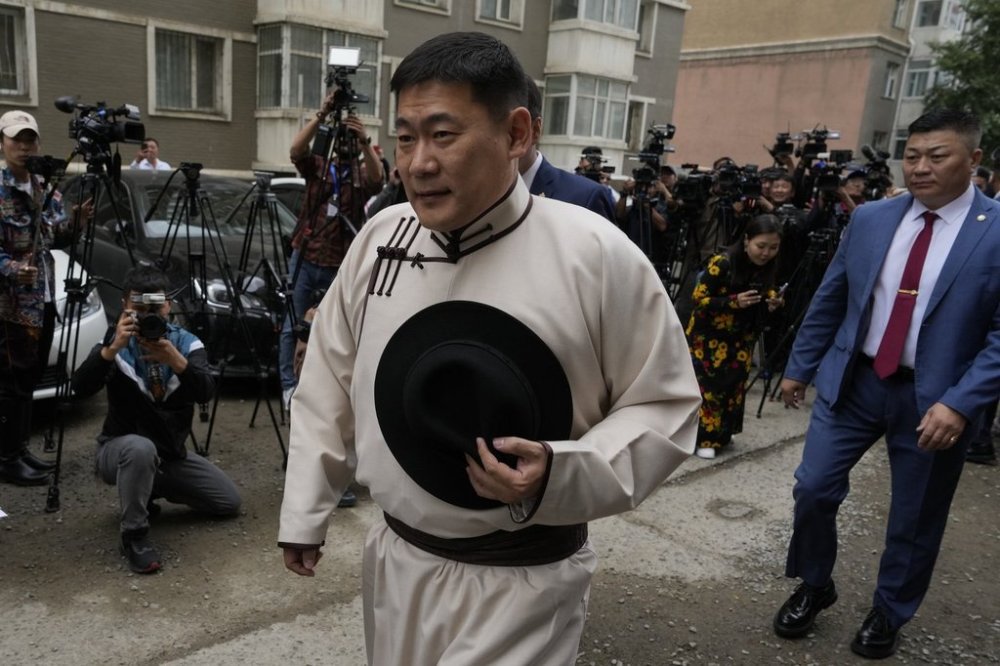Protests against prime minister in Mongolia could lead to government shake-up
Advertisement
Read this article for free:
or
Already have an account? Log in here »
To continue reading, please subscribe:
Monthly Digital Subscription
$1 per week for 24 weeks*
- Enjoy unlimited reading on winnipegfreepress.com
- Read the E-Edition, our digital replica newspaper
- Access News Break, our award-winning app
- Play interactive puzzles
*Billed as $4.00 plus GST every four weeks. After 24 weeks, price increases to the regular rate of $19.00 plus GST every four weeks. Offer available to new and qualified returning subscribers only. Cancel any time.
Monthly Digital Subscription
$4.75/week*
- Enjoy unlimited reading on winnipegfreepress.com
- Read the E-Edition, our digital replica newspaper
- Access News Break, our award-winning app
- Play interactive puzzles
*Billed as $19 plus GST every four weeks. Cancel any time.
To continue reading, please subscribe:
Add Free Press access to your Brandon Sun subscription for only an additional
$1 for the first 4 weeks*
*Your next subscription payment will increase by $1.00 and you will be charged $16.99 plus GST for four weeks. After four weeks, your payment will increase to $23.99 plus GST every four weeks.
Read unlimited articles for free today:
or
Already have an account? Log in here »
ULAANBAATAR, Mongolia (AP) — Mongolia’s 10-month-old coalition government appeared to be breaking up as protests calling on the prime minister to resign entered their ninth day.
The leaders of the three governing parties were meeting Thursday to review their coalition agreement, one day after the largest one — the Mongolian People’s Party — decided to eject the second largest from the coalition.
The People’s Party accused the Democratic Party of breaching the agreement after some of its younger lawmakers backed calls for the resignation of Prime Minister Oyun-Erdene Luvsannamsrai.

Democratic Party leader Gantumur Luvsannyam, who is the deputy prime minister, said that the views of those legislators were not the party’s position.
“I never signed anything saying I would gag my members. I know my party’s temperament,” he said.
The fate of the prime minister was unclear ahead of a parliament session on Friday. Oyun-Erdene has held the post for four years and survived previous calls to step down.
The ongoing protests were sparked by reports of lavish spending by the prime minister’s son. For the mostly young protesters, the reports brought to a head long-simmering complaints about government corruption involving officials and their families.
Ariunbileg Oyunbilegt, a 45-year-old mother of three, said she had been at the demonstrations from the start, largely out of “disgust” at the displays of wealth among the well connected, particularly the prime minister’s son.
“The promises by the prime minister to fight corruption are false and empty,” she said.
Another protester, Purevnamgil Batsaikhan, said he was also motivated by the graft among the ruling class, and felt the political system was due for changes to prevent malfeasance.
“The prime minister has been in office for six years, but nothing has changed,” said Purevnamgil, 26, adding that protesters were mainly young and not affiliated with any political party.
Thursday’s protest appeared to go off without violence, with many participants expressing their views on an open microphone.
Mongolia is a landlocked resource-rich nation of 3.5 million — half of whom live in the capital — that is squeezed between China and Russia. A communist state during the Cold War, it transformed into a democracy after the collapse of the Soviet Union.
The protesters say the country’s mineral riches have benefited business interests and the wealthy, while many Mongolians still live in poverty.
The coalition government was formed after an election setback for the People’s Party’s last June that reduced its majority to 68 seats in the 126-member parliament. The Democratic Party holds 42 seats and the third coalition member, the HUN party, has eight.

